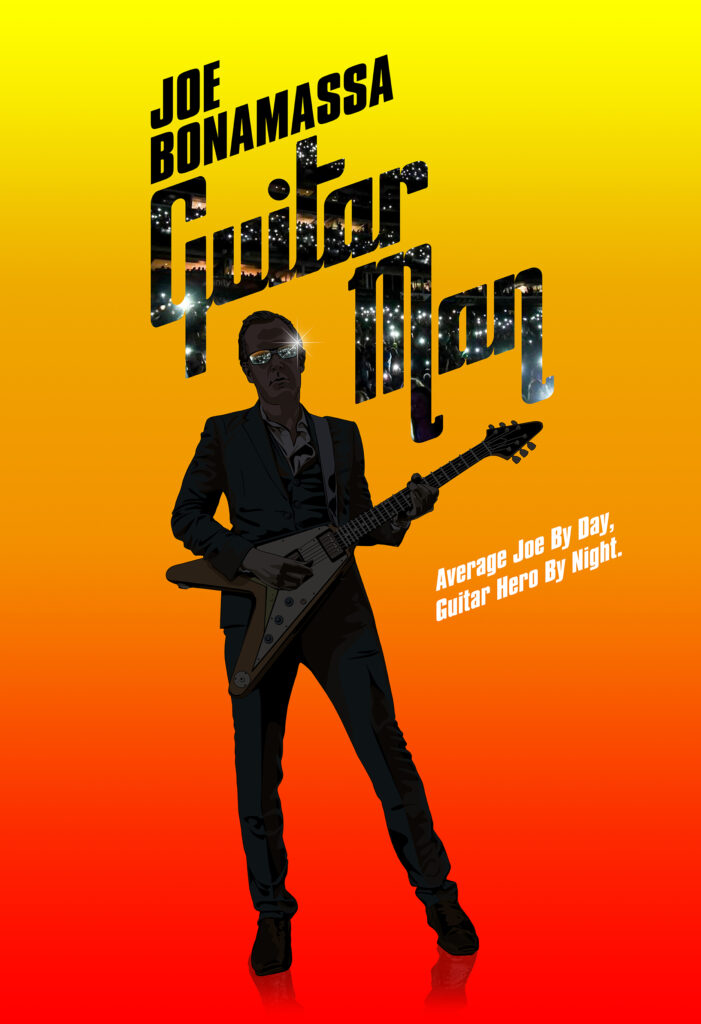
Joe Bonamassa is one of the finest bluesmen on the planet today and yet, as this documentary notes, the character who proves so incendiary onstage can prove strangely illusive once the suit and shades come off – to the extent that a be-denimed Bonamassa can drift through an audience he’s just wowed, without so much as a sideways glance from his legions. As such, although Guitar Man serves both as a timely celebration of a remarkable career and as a rumination on the sacrifices that such a career might accrue, it does not get as close to its subject as it might. Nevertheless, featuring extensive contributions from Joe, manager Roy Weisman and producer Kevin Shirley, the documentary does cover substantial ground, starting with Joe’s birth (“what starts bad, ends bad!”) and bringing us to the present day.
The documentary starts where it should – at the beginning, and it is these early passages that prove the most illuminating. Born into a musical family (his grandfather and great grandfather played the trumpet, whilst his father played the guitar), Joe had a guitar in his hand from the age of four, as evidenced by a mix of polaroid shots and grainy home video footage. By the age of twelve, Joe was playing alongside his heroes – Buddy Guy, Albert Collins and, legendarily, BB King, for whom he opened. That show led to an NBC special, which captures Joe as a geeky teen and this, in turn, attracted attention from a host of management firms interested in signing the young protégé. At this point Roy Weisman enters the frame, reminiscing about Joe’s bumpy induction into the world of show business.
And bumpy it was. At the age of eighteen, Joe found himself incorporated into Bloodline – a musically impressive, yet highly contrived, band featuring the offspring of rock illuminati. Never likely to last, the other members of the band proved unwilling to match Joe’s work ethic and although the modern-day Joe is remarkably sanguine about what must have been a traumatic experience, it led to a period of re-evaluation which, despite the pace of the documentary, must have felt like an eternity at the time.
Joe’s career started over when A&R man Michael Caplan, having heard a cassette demo, suggested a now-legendary Jethro Tull cover and Tom Dowd as a producer. This should have been the end of the story but, despite the impact the radio-rock styled Miss You, Hate You, the advent of streaming saw numerous artists arbitrarily dropped and a resilient (if slightly embittered) Joe took the opportunity to seize control of his career from thereon in. What followed, was an object lesson in blood sweat and tears, as Joe toured and recorded with his power trio – a section that is rather glossed over in the documentary’s desire to get to the big time.
Nevertheless, if Joe’s career was growing, it was still a tenuous thing. One of the biggest revelations is just how many risks Joe and his manager, Roy Weisman, took to hit stages such as the Royal Albert Hall. Joe’s debut on that auspicious stage, for example, was a gamble that, despite the presence of Eric Clapton (a moment over which Joe exudes boyish enthusiasm), would either launch Joe into the stratosphere or bankrupt him. The fact that Joe achieved the former rather than suffered the latter, is just one of the many triumphs represented in the documentary; but it’s still remarkable to find that it was only at that moment that Joe could finally call himself secure.
While we learn much of Joe’s early years from the man himself, as we head into what might be considered his golden years, so Joe’s natural reticence starts to assert itself. As such, the supporting cast take over, especially Kevin Shirley, who dominates proceedings. With Joe and Roy both noting that Kevin’s arrival was a pivotal moment, we are reminded of Bob Rock’s influence on Metallica, streamlining the sound in order to reach a wider audience and honing the commercial edge. The collaboration clearly brought great dividends to all involved, but whilst we hear much from a creative team with at least one eye on the commercial ball, we hear rather less about the remarkable music to which Joe has put his name. This is not helped by the fact that any musical insight which does emerge is taken from previously available footage, rather than freshly minted interviews. This is a shame, as we learn little about Joe’s relationship with his remarkable cast of supporting musicians and the documentary does more to record Joe’s success than really grapple with the awe-inspiring talent that underpins it.
As is now a matter of record, Joe Bonamassa is a one-of-a-kind musician. His guitar work is a thing of wonder, and the frequent (if rather too-short) clips of Joe on stage tell you far more about his ferocious talent than the interviews. As such, while the documentary excels in covering Joe’s formative years and his ascent through industry ranks, it says rather less about the music that got him there. Of course, any artist would be reluctant to give too much of themselves when their soul is already in their guitar, but there’s a feeling that, for all the well-shot footage that abounds, the definitive Bonamassa documentary is yet to be made. 7/10



